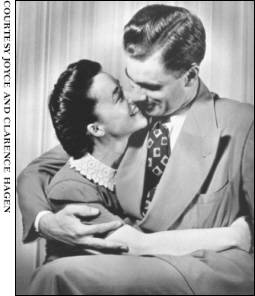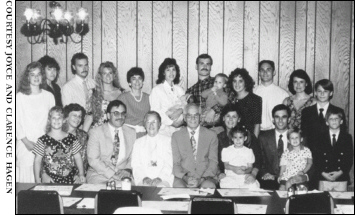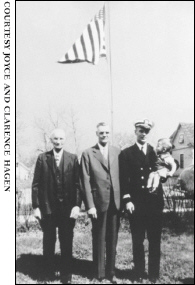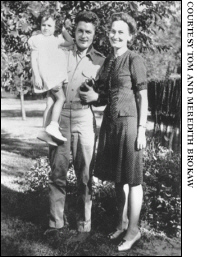Tom Brokaw (26 page)
The Dumbos, Halloween party, 1949
THE DUMBOS
“Expectations were different: We had a higher regard for
marriage. You just didn't divorce.”
O
THER WORLD WAR II
marriages became part of larger groups. Veterans formed such close associations with their wartime buddies that they became friends for life, and their wives learned to care for each other as well. In some cases, the wives were the catalysts for postwar friendships. Their husbands returned home to find their wives had gotten through the ordeal with the help of other women in similar straits. They were sisterhoods that did not end with the war. With the men back, it became an extended family, a gathering of couples who had shared experiences and common values.
In the small South Dakota city of Yankton, four wives with husbands in the service met to play bridge: my mother-in-law, Vivian Auld; her sister, Lois Gatchell; their friends La Verne Hubner and Joyce Hagen. Vivian's husband, Merritt, was an Army doctor who was overseas for five years, seeing heavy action in North Africa and Italy. Don Gatchell was in the Marines. Roland “Doc” Hubner, another physician, was a flight surgeon. Joyce's husband, Clarence (everyone called him “Hack”), was an officer aboard a heavy cruiser in the Pacific.
Joyce remembers that it was a mutual support group. All of the women were in their early to mid-twenties. Vivian, Joyce, and La Verne had infants at home, conceived before their husbands shipped out, born while they were abroad. It was an uncertain time in the lives of these young women with their husbands so far away, many of them in the line of fire. Joyce's anxiety for Hack only heightened when word came that her brother had been killed in action.
Now, however, more than a half century later, she remembers the solidarity of the little circle of women. She laughs when she says, “If any of the serviceman husbands came home, he had to take us all out to dinner. We'd save gas rations and drive to Sioux City [a small city with more restaurants, about sixty miles away from Yankton] and have a big dinner. Then we'd wait for the next husband to come home.”
The separation anxieties were not confined to the wives. Meredith, my wife, can remember seeing her father only once during her first five years, when Merritt managed a short home leave between the North African and Italian campaigns. Meredith lived with her mother at the home of her grandparents, not an unusual arrangement for war wives, especially those with small children. Nonetheless, she didn't have a father around during what we now call the bonding years. It must have been equally awkward for him. He returned home to find a five-year-old stranger as his daughter.
As a result their relationship evolved slowly; as she was growing up, it was more distant than it might have been if he had been home in the early years. By the time she was an accomplished adult, they were very close. How many other World War II fathers and children must have experienced the same early strains in their relationships?
Hack Hagen received word of their firstborn just after his ship, the heavy cruiser
Salt Lake City,
had been shot up in a raging naval battle in the North Pacific. It was welcome news after what he'd been throughâalmost four hours of intense exchanges with a Japanese armada twice the size of the American flotilla. In his definitive study of the naval battles during World War II, the distinguished Harvard historian Samuel Eliot Morison described how the
Salt Lake City
“received almost all of the enemy's attention” as the Japanese tried to sink the cruiser with shells fired from twelve miles away. They were almost successful. It took four major hits before the ship was forced to a stop after a battle that ran for almost a hundred nautical miles.

Joyce and Clarence Hagen, 1942

Joyce and Clarence Hagen's fiftieth anniversary, 1991,
with the entire Hagen family, Le Mars, Iowa
Several crew members were killed near where Hack was a gunnery officer, but as he says, “We just kept going.” Finally, the
Salt
Lake City
was dead in the water. The engine room had taken a hit, killing the power and causing some serious leaking. It appeared Hagen and the crew were doomed, but for some reason the Japanese broke off the attack and retreated. Morison figures that “smoke concealed . . .
Salt Lake
's plight” and that the Japanese worried American fighter bombers would arrive at any time.
The
Salt Lake City
managed to make it back to San Francisco for repairs, and Hack went on to South Dakota for a reunion with Joyce and their new son, Christopher. Before long, however, he was back on the high seas, once for three months without seeing land. He did have a way of letting Joyce know his whereabouts, however. In his weekly letters he made reference to a time of day, which she could then convert into latitude and longitude. As he says, “It was good for her to know and it was a comfort to me to know she was following along.”
Those letters, which took a long time to get back to South Dakota, did get special treatment from the mailman. Joyce recalls, “If a letter arrived from a brother or a husband, no matter what the time of day, the mailman got it to our house and dropped it through the mail slot. It was an extra kindness.”
Most of the war news came from the big cabinet radios that were a fixture in every living room. Meredith remembers the nightly ritual in her grandparents' home, when everyone would gather and remain absolutely still as they listened to the news from the front. With so much action on so many fronts and the filter of military censorship, they were getting only the big picture. For long stretches of time they had no idea exactly where their husbands were or how they were doing. There were millions of these young wives, women in their twenties, their lives in a state of suspension as they awaited the return of their husbands, always dreading that the unexpected knock at the door would be a telegram or their minister with news that he wouldn't be coming back.
There were other sources of information if you were in the right place. Lois Gatchell was living in San Francisco before she returned to Yankton. Her husband, Don, was a Marine officer on the USS
Ticonderoga
when it was attacked and almost sunk by two Japanese kamikaze planes. He says to this day, “I can still see themâtwo Japanese planes headed right for us. It was a mess.” Lois remembers her friends who were Navy wives knew almost instantly what had happened, well before the news became public. “It was an incredible grapevine,” she says. “They knew before anyone.” It was not until the ship returned, however, that she knew Don was okay.

Four generations of Hagens
(left to right): Torger Hagen,
George Hagen, Clarence
Hagen, Christopher Hagenâ
Webster, South Dakota, 1945

Meredith, Merritt,
and Vivian Auld
As a result of these harrowing experiences, the young women became emotionally mature beyond their years, just as their husbands were learning to grow up fast with the responsibilities and duties that came with military service. In the nineties, young men and women often talk of using their twenties to find themselves, to explore the options of life. Their grandparents at the same age found themselves in a hurry.
It wasn't always perfect, of course. Couples who were just getting started in their relationship were living with the strain of protracted periods of separation, the absence of timely communications between the wife at home and the husband abroad, the anxieties brought on by the everyday life-and-death dangers of war.
When Meredith's father returned after five long years away, he brought with him a letter from his mother-in-law, Nan Harvey, written in June 1945. It was a poignant yet firm plea for him to come home. She was worried about his wife, her daughter Vivian.
Nan couldn't believe that the Army was insisting Merritt stay on awhile longer even though the war was over. She said that Vivian was “on the verge of the breaking point after hearing you can't get home. . . . The long separation for you and Vivian has been
too
long for you both and it does worry us.” Nan went on to relate Vivian's worry that the continuing separation diminished “the chances to finish life together happily.” Plainly, the brave front put up by Vivian and millions of other wives at home was often just that, a front. Who could blame them for their anxieties?
Merritt apparently got the message, for he came back to Yankton not too long after that, and his marriage to Vivian was long, happy, and productive. They had five children and regularly took in young women who came from troubled homes.
In fact, when the war was over,
all
the husbands of the women in the weekly bridge game returned home safely and went swiftly into their civilian careers. Auld and Hubner joined a medical practice in Yankton. Gatchell entered the insurance business, and Hack resumed the teaching career he had started before the war.
The wives decided not to give up what had been so important to them during the warâtheir regular meetings and, by now, very deep friendships. They decided to organize a dinner club and monthly bridge game. They named it Dumbo for one of those silly reasons: the dinners would be jumbo, with everyone bringing food, and someone laughingly suggested, “Dumbo Jumbo, that's us.”
The monthly dinners and bridge games went on for the next thirty-five years, and the friendships only deepened as time went along. Hack and Joyce Hagen were absent for a time while he got a degree in optometry, financed in part with a loan from one of the Dumbo members. He set up practice in LeMars, Iowa, just sixty miles from Yankton, and they resumed their regular attendance at Dumbos.
For the women it was not an easy time, for it was very much a man's world in the immediate postwar years. In Yankton, married women were not hired as schoolteachers, and in Dr. Auld's medical partnership his own sister, a pediatrician with a thriving practice, was paid half of what the male partners earned. There were no women lawyers or business owners. It wasn't fair, especially after all the contributions women had made during the war, but for most of the wives there were other immediate priorities. Children were coming in waves and homes were being bought or expanded. Husbands were working long hours, trying to catch up after their years of military service. Given the current place of women in American life, it is difficult to imagine that time. It is equally difficult to appreciate the urgency of young couples to get on with their marriages after the uncertainties of the war years. It was, as they say, a different time, and it made possible what was to come.

